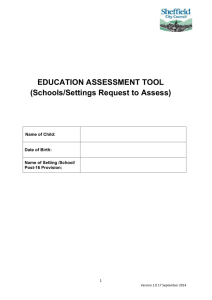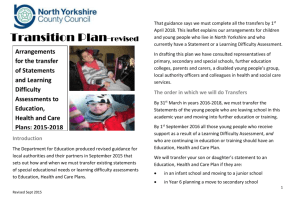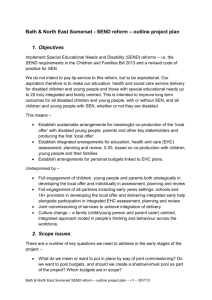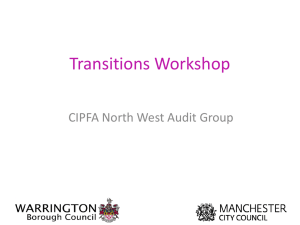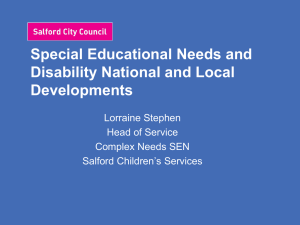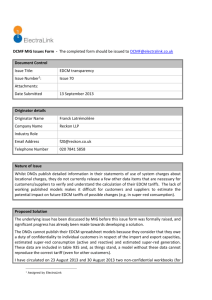Draft provisions on SEN and disability
advertisement
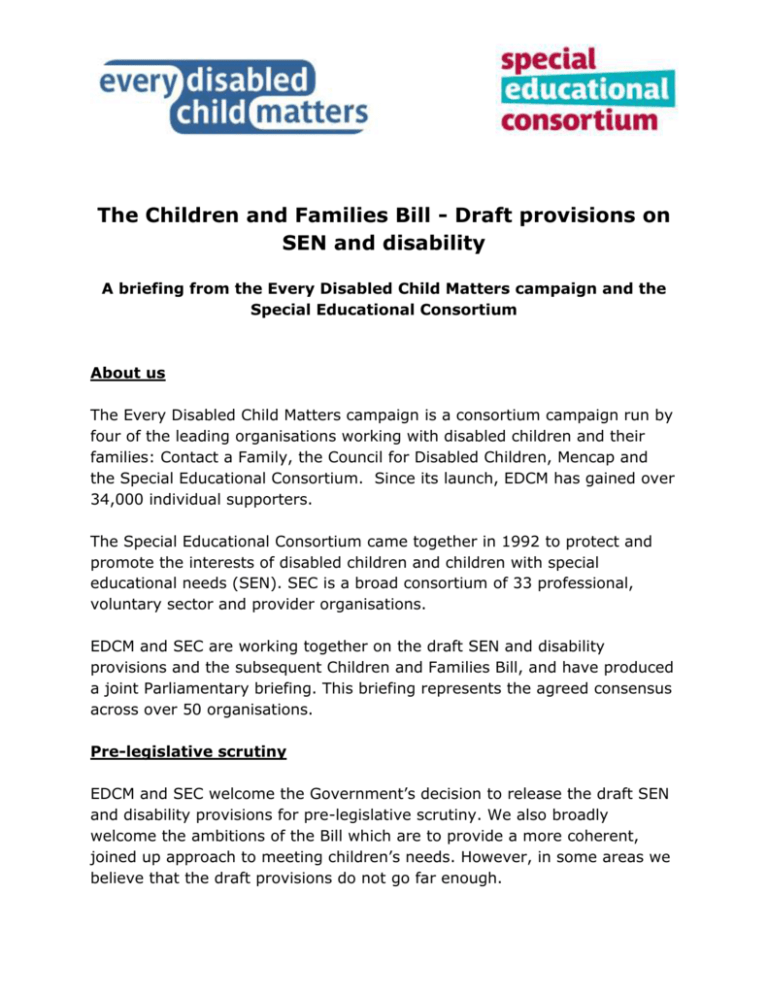
The Children and Families Bill - Draft provisions on SEN and disability A briefing from the Every Disabled Child Matters campaign and the Special Educational Consortium About us The Every Disabled Child Matters campaign is a consortium campaign run by four of the leading organisations working with disabled children and their families: Contact a Family, the Council for Disabled Children, Mencap and the Special Educational Consortium. Since its launch, EDCM has gained over 34,000 individual supporters. The Special Educational Consortium came together in 1992 to protect and promote the interests of disabled children and children with special educational needs (SEN). SEC is a broad consortium of 33 professional, voluntary sector and provider organisations. EDCM and SEC are working together on the draft SEN and disability provisions and the subsequent Children and Families Bill, and have produced a joint Parliamentary briefing. This briefing represents the agreed consensus across over 50 organisations. Pre-legislative scrutiny EDCM and SEC welcome the Government’s decision to release the draft SEN and disability provisions for pre-legislative scrutiny. We also broadly welcome the ambitions of the Bill which are to provide a more coherent, joined up approach to meeting children’s needs. However, in some areas we believe that the draft provisions do not go far enough. This briefing sets out our views on how the draft provisions could be improved in order to better realise the Government’s intentions. Definitions and scope (provisions 1-4) EDCM and SEC welcome the extension of local authority responsibilities to cover all children with SEN. This replaces the current duty that only applies to children who may need a statement of SEN. However, the draft provisions do not apply to disabled children or those with a health condition unless they require special educational provision. Not all disabled children require this type of provision. EDCM and SEC believes that if the Government wishes to achieve its ambitions to have a more coherent approach to meeting children’s needs, the draft provisions need to apply to children who have health and care needs but who don’t necessarily require special educational provision. In order to achieve this we suggest that the provisions, which currently apply only to children with special educational needs, should be amended to include all disabled children. The Bill applies directly to mainstream schools, including academies (including free schools) and maintained schools, and colleges. EDCM and SEC warmly welcome the application of the draft provisions directly to academies and colleges. Local integration and information (provisions 5-12) The draft provisions require named partners to cooperate in relation to meeting the education, health and care needs of children and young people with SEN. Partners include special and mainstream schools and colleges, local authorities (including in relation to social services), providers of alternative provision and key health agencies. EDCM and SEC warmly welcome the emphasis on joint working and cooperation across services Draft clause 6 will require local authorities and clinical commissioning groups to make arrangements for joint commissioning. This includes arrangements for considering and agreeing reasonable provision to meet the needs of all children with SEN in the area, and specifically for children with EHC plans. LAs and clinical commissioning groups have to have regard to these agreements, and also to the joint health and wellbeing strategy, when undertaking their functions. EDCM and SEC welcome these joint commissioning requirements. We believe that joint planning and commissioning will need to be joined up with commissioning arrangements undertaken by Health and Wellbeing Boards. These were established by the Health and Social Care Act 2012. There needs to be clear structural links between existing legally established coordination bodies, in particular between Children’s Trust arrangements and Health and Wellbeing Boards. Draft clause 7 requires local authorities to keep education and social care provision under review, including whether local provision is “sufficient” to meet local need. EDCM and SEC believe that that there should be a requirement to involve parents, young people and health and care providers in this review of local services. Currently, draft clause 7 only requires local authorities to consult education providers. We believe the Government should rectify these omissions. Draft clause 11 requires local authorities to produce information on the education, health and care services it “expects” to be available locally (the local offer). This will include information on provision available outside its area. The details of what the local offer should include and who should be consulted will be set out in regulations. EDCM and SEC welcome the principle of a local offer. However, it is essential that there is a legal duty to provide what is set out in the local offer and that this can be challenged by parents and young people if it is not delivered. Without this legal basis the local offer will not fulfil its intended function. To address the postcode lottery of support, EDCM and SEC believe some form of national standard should inform the development of each local offer. Children with lower incidence SEN or disabilities may be better served by regional provision. Their needs should be addressed as part of this standard. While the inclusion in the local offer of education, health and care services is welcome, there are other services which we feel should also included. For example, employment support to help young disabled people find work and advocacy services are not included in the information that will need to be made available. Draft clause 12 will requires local authorities to ensure there is advice and information available locally for parents and young people . EDCM and SEC welcome the extension of the information duty to include young people. We believe the Government should ensure that providers of this information are trained and resourced to provide age appropriate information and advice. Education, health and care needs assessment and EHC plans (provisions 16-28) Statements of SEN will be replaced with education, health and care plans (EHC plans). However, most of the provisions in relation to EHC plans remain the same as for statements. The threshold for an EHC plan is the same as for a statement – effectively that a school is unable to meet a child’s special educational needs. The plan will cease when a young person is no longer in education or training. EDCM and SEC welcome the concept of a multiagency plan covering young people from birth to 25. We believe that children and young people who have significant health and social care needs, but do not necessarily currently have a statement of SEN, should also have access to the new integrated system. We therefore believe that the new plan should be accessed via other routes than just education. We also have particular concerns that young people between the ages of 18 and 25, who may move in and out of education or leave education altogether, may lose access to support. We urge the Government to go further and commit to supporting young Health and social care will havesetting to be explicitly recorded the people up to 25,needs in whatever and whether orin not EHCare plan. However, there are no new duties on health will and social they in education or training. The Government also care in relation to delivering what is inprovisions a EHC plan,complement though there the is a duty need to ensure that these draft to co-operate with the local above. adult social care reforms in authority, the draft see Care and Support Bill. In order to improve on the current system, EDCM and SEC believe there should be new statutory duties on health and social care services to deliver what is set out in the EHC plan. We also believe that parents should have a clear right to appeal if health and social care services do not deliver on what they have promised. EHC plans will extend all the statutory rights currently in a statement into the further education and training sector for the first time, which we welcome. However, young people in apprenticeships or higher education will not benefit from these new entitlements. EDCM and SEC welcome the extension of statutory entitlements into further education. However, we believe these rights should be extended to other settings, including apprenticeships and higher education. Mediation Draft clause 29 requires parents or young people to participate in mediation before they can appeal to the Tribunal. The mediator must be independent of the LA. We are concerned that this proposal will add an extra stage in the process and place an additional demand on parents. Requiring parents to attend mediation is not a substitute for a continuing dialogue between parents and the local authority. SEN Code of Practice There will be a revised Code of Practice, but unlike the current Code, it will not have to be consulted on or laid before Parliament. EDCM and SEC believe the draft Code of Practice should be laid before Parliament. Parliamentary approval of the Code sends a signal to everyone about its significance. For more information please contact John Dickinson-Lilley, Vice-Chair of the Special Educational Consortium John.Dickinson-Lilley@sense.org.uk, 020 70149314 Laura Courtney, Campaign Manager, Every Disabled Child Matters Laura@edcm.org.uk, 020 7843 6448 Matthew Dodd, Policy Officer, Special Educational Consortium mdodd@ncb.org.uk, 020 7843 9709
